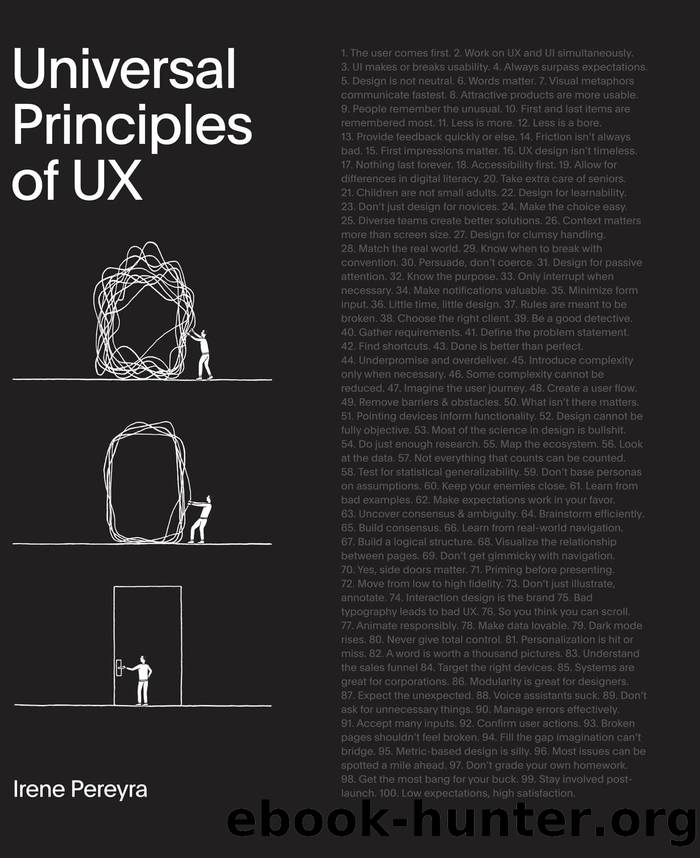Universal Principles of UX by Irene Pereyra

Author:Irene Pereyra
Language: eng
Format: epub
Publisher: Rockport Publishers
Published: 2023-06-15T00:00:00+00:00
Most companies selling design research are selling a pseudo-scientific con.
52
Design cannot be fully objective.
In 1972, in the annex of the Stedelijk Museum in Amsterdam, Dutch graphic designers Wim Crouwel and Jan van Toorn debated whether objectivity or subjectivity works better in design. Crouwel argued in favor of the graphic designer as the rational and objective service provider, and van Toorn argued that such objectivity is not only impossible but a disservice to society, as personal expression communicates much more powerfully.
While graphic design has since moved on from this debate, with both rational and personal expression holding credence, the debate still remains in the UX design field fifty years later. Objectivity is often considered to be ideal for UX design. Research methods (usability testing, ethnographic studies, card-sorting exercises, and more) are meant to result in an empirical and objective design in which the designerâs personal preferences have been replaced by agreed-upon evidence. Itâs science.
Except itâs not. Most companies selling design research are selling a pseudo-scientific con.
I have seen highly suspect conclusions from research studies where leading questions were asked to a ridiculously small number of people. I have also seen designers test the usability of their own products in such a way that the results always skew positive (see Principle 97). All this research is extremely expensive, takes a lot of time, and is often given greater importance than intuition and experience-based design decisions.
Iâm not saying donât do researchâwe do research in our studio. But letâs not pretend that the research is in any way scientific, or that it results in objective design. Research can help inform the design and remove some of your own bias, but it does not offer absolute truths (see Principle 53). The person who guides the research and interprets the results is still human and therefore unable to fully remove their own bias.
The emphasis on objectivity narrows our perspective and makes us less free, less open-minded, less creative, and less human in our thinking. I agree with van Toorn. Letâs welcome the diversity of different personal and idiosyncratic perspectives. Listening to our intuition, acknowledging our past experiences, and bringing the totality of our human experience to the table is our greatest advantage as designers.
Download
This site does not store any files on its server. We only index and link to content provided by other sites. Please contact the content providers to delete copyright contents if any and email us, we'll remove relevant links or contents immediately.
Bad Blood by John Carreyrou(6610)
Rich Dad Poor Dad by Robert T. Kiyosaki(6600)
Principles: Life and Work by Ray Dalio(6413)
Playing to Win_ How Strategy Really Works by A.G. Lafley & Roger L. Martin(6218)
Management Strategies for the Cloud Revolution: How Cloud Computing Is Transforming Business and Why You Can't Afford to Be Left Behind by Charles Babcock(4563)
The Confidence Code by Katty Kay(4248)
Thinking in Bets by Annie Duke(4216)
American Kingpin by Nick Bilton(3872)
Delivering Happiness by Tony Hsieh(3417)
Project Animal Farm: An Accidental Journey into the Secret World of Farming and the Truth About Our Food by Sonia Faruqi(3212)
The Power of Habit by Charles Duhigg(3124)
The Tyranny of Metrics by Jerry Z. Muller(3059)
Brotopia by Emily Chang(3047)
The Marketing Plan Handbook: Develop Big-Picture Marketing Plans for Pennies on the Dollar by Robert W. Bly(3045)
Mastering Bitcoin: Programming the Open Blockchain by Andreas M. Antonopoulos(3035)
I Live in the Future & Here's How It Works by Nick Bilton(2990)
The Content Trap by Bharat Anand(2915)
Building a StoryBrand by Donald Miller(2895)
Applied Empathy by Michael Ventura(2888)
